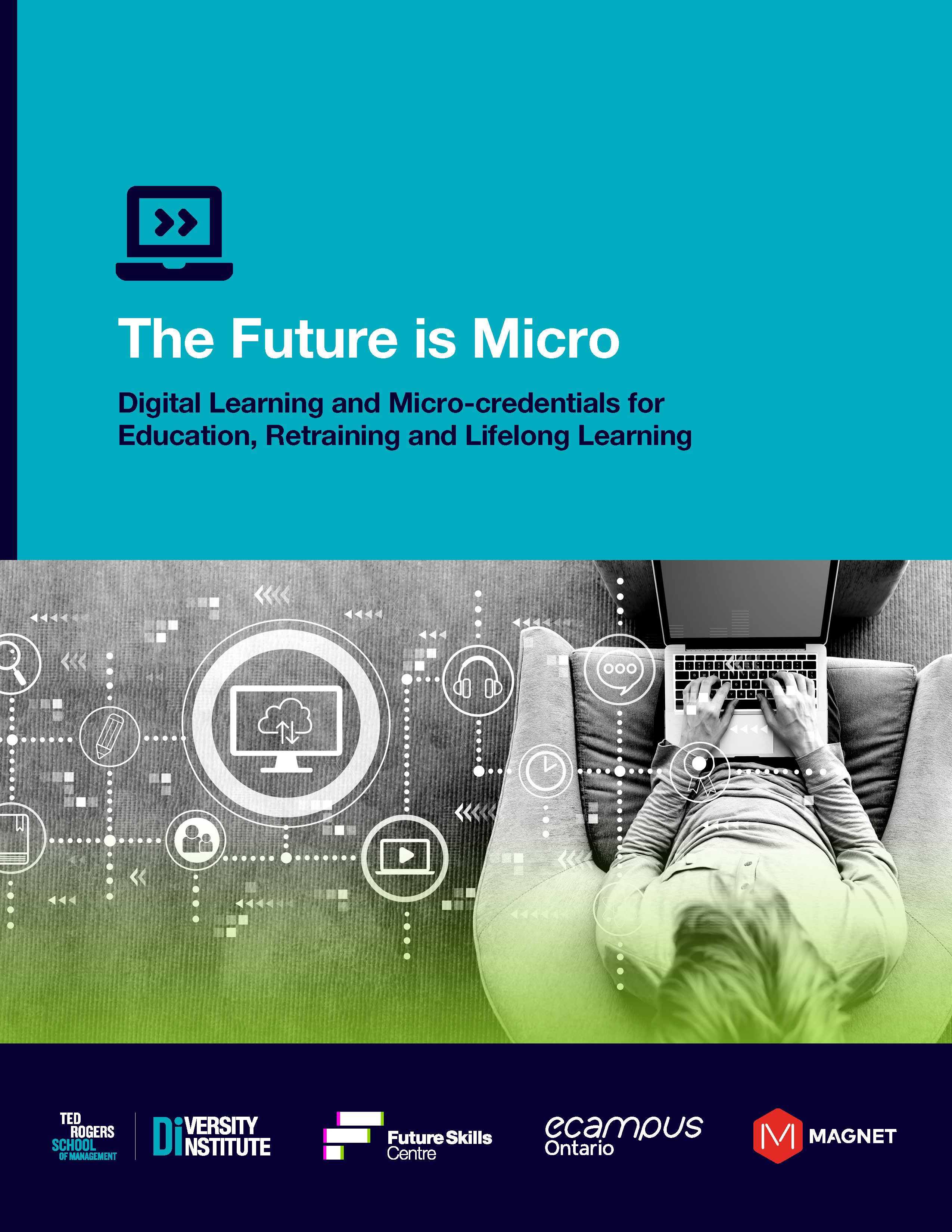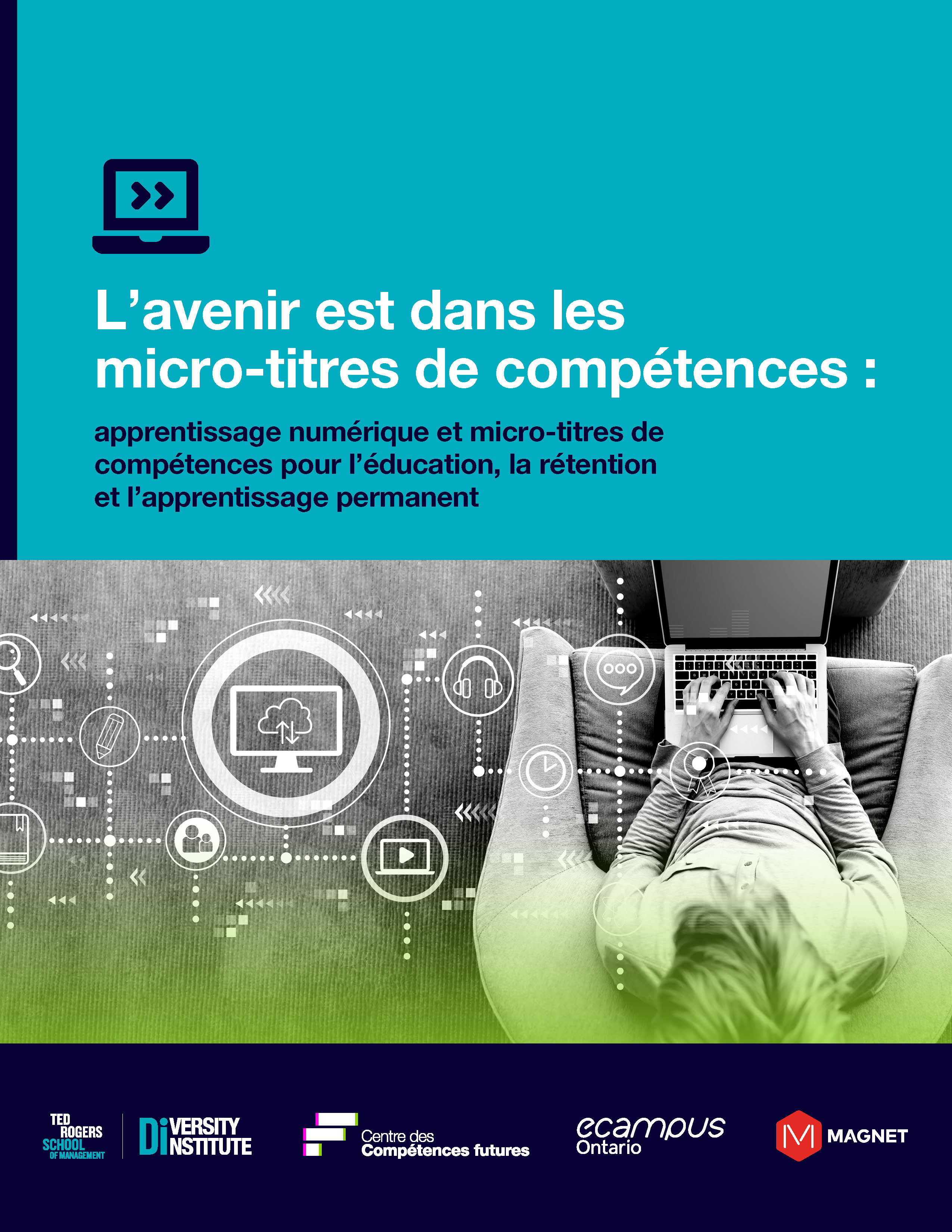The Future is Micro
Digital Learning and Micro-credentials for Education, Retraining and Lifelong Learning
Canada | 2022
With the onset of the COVID-19 pandemic in 2020, there was an immediate need for rapid retraining and re-skilling as the workforce adapted to new health and safety protocols and shifted heavily toward remote working.
Employers and post-secondary institutions (PSIs) responded with renewed interest in flexible, agile, and responsive systems of learning and work-relevant training that could connect them with learners and employment partners in both program design and delivery. Micro-credentials offer an exciting option for meeting these needs and are currently being explored in Ontario, across Canada, and around the world. Indeed, in just the last few months, a series of reports on initiatives have been published, helping to advance our evolving understanding of the function, governance, and context of micro-credentials in Canada.
While these high-level conversations about micro-credentials are unfolding, it is critical to consider the lived experiences of those who are already developing and delivering them. Over the last three years, eCampusOntario has worked with a variety of partners to develop micro-credential initiatives at Ontario PSIs through a series of pilot projects. While each of these pilot projects is unique, they were all designed using the collaboratively co-created eCampusOntario Micro-credential Principles and Framework, a blueprint for creating and scaling micro-credential programs in Ontario.
This report, which is part of a larger collaboration between eCampusOntario (external link, opens in new window) , the Diversity Institute, Magnet (external link, opens in new window) , and the Future Skills Centre (external link, opens in new window) , focuses on these pilot projects to illuminate what is working, what is missing, and where we might be going when it comes to micro-credentials in Canada. We collected these experiences using a mixed-methods approach: 1) a survey of eCampusOntario’s micro-credential pilot project leads, and 2) a series of focus groups that included pilot project leads and community and employer partners involved in one of the 36 pilot projects. This approach was designed to capture the on-the-ground experiences of those engaged with the pilot program, and to explore their perceptions and beliefs about the future of micro-credentials in Ontario.
Key Takeaways
- Micro-credentials are a new and innovative way to recognize and demonstrate proficiency in skills and competencies and have great potential to play an important role in addressing skills gaps in the labour market
- Micro-credentials offer the value of being able to be quickly designed to be relevant to employer and industry needs
- Micro-credentials are not intended to replace traditional forms of higher education; rather, they are often designed to be connected to or integrated into an established post-secondary education system
L’avenir est dans les micro-titres de compétences
Apprentissage numérique et micro-titres de compétences pour l’éducation, la rétention et l’apprentissage permanent
Avec l’arrivée de la pandémie de COVID-19 en 2020, il y a eu un besoin immédiat de recyclage et de requalification rapides, alors que la maind’oeuvre s’est adaptée aux nouveaux protocoles de santé et de sécurité et s’est tournée fortement vers le travail à distance.
Les employeurs et les établissements d’enseignement postsecondaire (EPS) ont réagi en manifestant un intérêt renouvelé pour des systèmes d’apprentissage et de formation professionnelle souples, agiles et réactifs qui pourraient les mettre en relation avec les apprenants et les partenaires de l’emploi, et ce, tant pour la conception que pour la prestation des programmes.
Les micro-titres de compétences offrent une option intéressante pour répondre à ces besoins collectifs; ils sont explorés en Ontario, partout au Canada et dans le monde. En effet, au cours des derniers mois, une série de rapports sur des initiatives ont été publiés, contribuant à faire progresser notre compréhension de la fonction, de la gouvernance et du contexte des micro-titres de compétences au Canada.
Alors que ces conversations de haut niveau sur les micro-titres de compétences se déroulent, il est essentiel de prendre en compte les expériences vécues par ceux qui les élaborent et les donnent déjà. Au cours des trois dernières années, eCampusOntario a travaillé avec divers partenaires pour élaborer des initiatives de micro-titres de compétences dans les EPS ontariens par le biais d’une série de projets pilotes. Bien que chacun de ces projets pilotes soit unique, ils ont tous été conçus à l’aide du document Principes et cadre de microcertification, un plan cocréé en collaboration dans le but de préparer et de mettre à l’échelle les programmes de micro-titres de compétences en Ontario.
Ce rapport, qui s’inscrit dans le cadre d’une collaboration plus large entre eCampusOntario, le Diversity Institue, Magnet et le Centre des Compétences futures, met l’accent sur ces projets pilotes afin de mettre en lumière ce qui fonctionne, ce qui manque et ce que l’avenir nous réserve au chapitre des micro-titres de compétences au Canada. Nous avons recueilli ces expériences en utilisant une approche mixte : 1) un sondage auprès des responsables des projets pilotes de microtitres de compétences d’eCampusOntario, et 2) une série de groupes de discussion comprenant des responsables de projets pilotes et des partenaires communautaires et employeurs participant à l’un des 36 projets pilotes. Cette approche a été conçue pour rendre compte des expériences sur le terrain des personnes engagées dans le programme pilote et pour explorer leurs perceptions et leurs croyances sur l’avenir des micro-titres de compétences en Ontario.
Points Clés
- Les micro-titres de compétences sont une façon novatrice de démontrer la maîtrise d’aptitudes et de compétences et offrent un outil potentiellement transformateur pour aider à combler les lacunes et les besoins en matière de compétences sur le marché du travail canadien.
- Les micro-titres de compétences permettent une conception rapide afin de répondre aux besoins des employeurs et de l’industrie
- Les micro-titres de compétences ne sont pas destinés à remplacer les formes traditionnelles d’enseignement supérieur. Ils sont plutôt souvent conçus pour être reliés ou intégrés à un système d’enseignement postsecondaire établi.
Published:
March 2022

